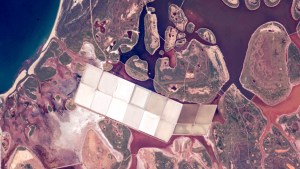In October 2021, William Shatner — famous for his role as Captain Kirk in Star Trek — went into space. He was the oldest living person to do so at ripe young age of 90, but he couldn’t resist the opportunity of a lifetime.
The experience was not what he expected.
In an excerpt from his new book, Boldly Go: Reflections on a Life of Awe and Wonder,Shatner reflects on his trip into space on the Blue Origin space shuttle and says he was surprised by his own reaction.
While he writes that he has always loved the mystery and questions of the universe, all that he saw was “death” when he looked into space — “unlike any blackness you can see or feel on Earth. It was deep, enveloping, all-encompassing,” he writes. In contrast, what Shatner says he saw when he looked at Earth was life.
“Everything I had thought was wrong. Everything I had expected to see was wrong,” he writes in his book.
It was among the strongest feelings of grief I have ever encountered. The contrast between the vicious coldness of space and the warm nurturing of Earth below filled me with overwhelming sadness. Every day, we are confronted with the knowledge of further destruction of Earth at our hands: the extinction of animal species, of flora and fauna … things that took five billion years to evolve, and suddenly we will never see them again because of the interference of mankind. It filled me with dread. My trip to space was supposed to be a celebration; instead, it felt like a funeral.
Shatner says he later learned that the feeling he experienced has a name — the “Overview Effect” and it is common among astronauts.
When people go into space, they gain a profound sense of the beauty and fragility of the planet. They no longer see national borders or what divides us, but the planet as a whole — an awesome oasis of life. And it creates a big shift in their worldview.
Here is what 6 other astronauts had to say about seeing the Earth from space — plus a related comment by the always wise and reflective St. John Paul II.
It suddenly struck me that that tiny pea, pretty and blue, was the Earth. I put up my thumb and shut one eye, and my thumb blotted out the planet Earth. I didn’t feel like a giant. I felt very, very small.
-Neil Armstrong, the first human to walk on the moon
I thought at one point, if you could be up in heaven, this is how you would see the planet. And then I dwelled on that and said, no, it’s more beautiful than that. This is what heaven must look like. I think of our planet as a paradise. We are very lucky to be here. – Mike Massimino, NASA astronaut
In the future, I would like to be more of an advocate for animal conservation. Every single part of the Earth reacts with every other part. It’s one thing. Every little animal is important in that ecosystem. [Seeing the planet from above] makes you realize that, and makes you want to be a little more proactive in keeping it that way. If I could get every Earthling to do one circle of the Earth, I think things would run a little differently.
-Karen Nyberg, NASA astronaut and the 50th woman in space
Oddly enough the overriding sensation I got looking at the earth was, my god that little thing is so fragile out there.
-Mike Collins, Apollo 11 astronaut
That beautiful, warm, living object looked so fragile, so delicate, that if you touched it with a finger it would crumble and fall apart. Seeing this has to change a man. – James B. Irwin, astronaut in the Apollo Program
The Earth was small, light blue, and so touchingly alone, our home that must be defended like a holy relic.
–Aleksei Leonov, Russian cosmonaut, first person to conduct a spacewalk




